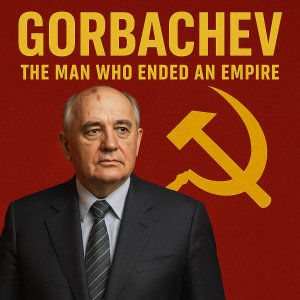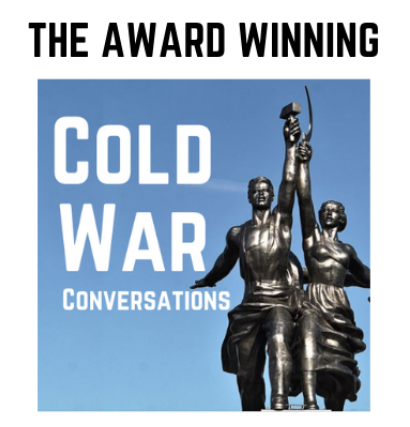Listen on Apple PodcastsListen on SpotifyListen on YouTubeListen on Amazon MusicListen on Podcast AddictBecome a Patron!

In the annals of history, few leaders have faced the monumental challenges that Mikhail Gorbachev encountered when he rose to power in the Soviet Union in 1985. His ascent came at a time when the nation was grappling with stagnation, disillusionment, and an economy on the brink of collapse. Gorbachev, the youngest General Secretary in Soviet history, was thrust into a leadership role that demanded not only a vision for reform but also the courage to confront an entrenched bureaucracy resistant to change.
Gorbachev’s early days in office were marked by a duality of urgency and caution. He understood that the Soviet system was in dire need of revitalisation, yet he remained committed to the principles of socialism. His introduction of the terms perestroika (restructuring) and glasnost (openness) would come to define his leadership. Initially, these concepts were presented as tools for reform, aimed at improving transparency and invigorating the economy without dismantling the ideological foundations of the state.
However, as Gorbachev began to implement his reforms, the complexities of the Soviet system became increasingly evident. His attempts to stimulate economic productivity faced formidable obstacles, including bureaucratic inertia and widespread corruption. The anti-alcohol campaign he launched, while well-intentioned, backfired spectacularly, leading to public resentment and a burgeoning black market. Despite these setbacks, Gorbachev remained steadfast, believing that the system could be renewed from within.
The geopolitical landscape during Gorbachev’s tenure was equally tumultuous. The Cold War was at a critical juncture, with escalating tensions between the Soviet Union and the West. Gorbachev’s willingness to engage in dialogue with leaders like Ronald Reagan marked a significant shift in Soviet foreign policy. The Geneva and Reykjavik summits, while not yielding immediate results, laid the groundwork for a thaw in relations and a new approach to arms control.
As Gorbachev’s reforms began to take root, the Soviet populace experienced a cultural awakening. Glasnost allowed for a newfound freedom of expression, leading to discussions of previously taboo topics and a re-examination of the Soviet past. This openness, however, also unleashed a torrent of nationalism among the various republics, challenging the very fabric of the Soviet Union. The rise of nationalist movements, coupled with economic turmoil, created an environment ripe for upheaval.
The failed coup in August 1991 was a turning point for Gorbachev. Although he managed to retain power, his authority was irrevocably diminished. The subsequent declarations of independence by various republics underscored the collapse of the Soviet Union, culminating in Gorbachev’s resignation on December 25, 1991. His departure marked the end of an era and the dissolution of a superpower that had once commanded global influence.
In retrospect, Gorbachev’s legacy is a complex tapestry of reform, resistance, and unintended consequences. He is often celebrated in the West as a visionary who ended the Cold War without bloodshed, yet in Russia, he is frequently viewed as the architect of the Soviet Union’s demise. His attempts to create a more open and democratic society were met with both hope and hostility, and the very reforms he championed ultimately unravelled the system he sought to preserve.
As we reflect on Gorbachev’s impact, it is clear that his leadership was a pivotal moment in history. He navigated the treacherous waters of reform with a belief in the possibility of renewal, yet the forces of nationalism, economic crisis, and political resistance proved too powerful to contain. Gorbachev’s story serves as a reminder of the complexities of leadership in times of profound change and the enduring struggle for a more just and equitable society.
The fight to preserve Cold War history continues and via a simple monthly donation, you will give me the ammunition to continue to preserve Cold War history. You’ll become part of our community, get ad-free episodes, and get a sought-after CWC coaster as a thank you and you’ll bask in the warm glow of knowing you are helping to preserve Cold War history.
Just go to https://coldwarconversations.com/donate/
If a monthly contribution is not your cup of tea, we welcome one-off donations via the same link.
Find the ideal gift for the Cold War enthusiast in your life! Just go to https://coldwarconversations.com/store/
Follow us on Twitter https://twitter.com/ColdWarPod
Facebook https://www.facebook.com/groups/coldwarpod/
Instagram https://www.instagram.com/coldwarconversations/
Youtube https://youtube.com/@ColdWarConversations
Love history? Join Intohistory https://intohistory.com/coldwarpod
